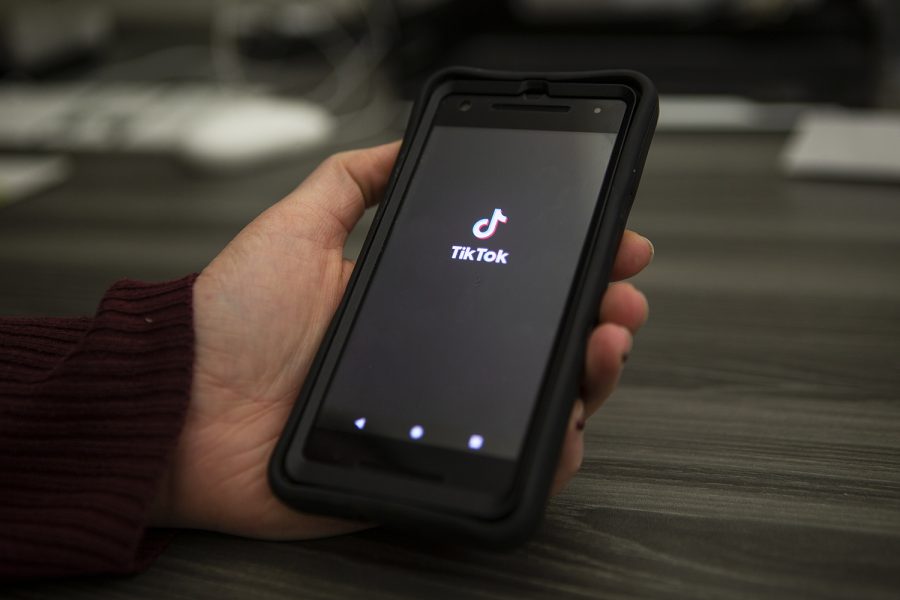UI TikTok creators plan to stay with the app despite possible ban
TikTok plays a variety of roles for students and faculty at the University of Iowa. Some content is light hearted and humorous, while other videos seek to educate people on social problems.
Photo Illustration by Jenna Galligan
July 22, 2020
Swiping through her “For You” page on the popular video-sharing app TikTok, Breck Goodman can see posts ranging from astrology content to short clips of toads. The incoming third-year student at the University of Iowa downloaded the app in April 2019. She posted her first video a week later and was surprised when a girl in her dorm told her it had gone viral.
Since then, Goodman has shared several comedic videos on her account, which currently has over 150,000 followers.
“People’s initial reaction is, ‘Oh, do you like post videos of you dancing? Do you post risky videos, anything like that?’” Goodman said. “I’m like, ‘Nope, I literally just post funny videos, or I like to think they’re funny.’”
Goodman said she began posting jokes since she was in high school and enjoyed it, especially on Twitter. Since she began showing her humor in a video format in the past year, she said the validation from her views has brought her a lot of self-confidence.
Outside of creating videos on the app, Goodman said she enjoys watching other TikTok creators and has been able to learn about different experiences from these compact videos.
“To get to know different stories, get to know different people, to see different cultures, to become educated, it’s one of the beautiful things about social media now these days, we have access to all these connections — we have access to all these people,” she said. “And I know, especially with all the tension that’s been going on, I’ve been able to get a lot of critical information from there that I never even knew.
TikTok has subgroups for almost anything, from aesthetic crafting and fashion content and to cultural education and political activism — however the platform may now be in a risky position in the U.S.
Secretary of State Mike Pompeo told Fox News in early July that the U.S. administration was looking into the app and considering limiting national user access to it. TikTok has an American CEO, but the app is owned by the Chinese company ByteDance. The connection with the foreign government has sparked privacy concerns.
For Goodman, these concerns aren’t enough to do away with the app.
“I thought it was dumb, just because every social media platform takes your information, no matter what, and then you have cases like Facebook, where they illegally sell your information,” Goodman said. “So I was like, it’s going to be very difficult for them to take TikTok down when everything basically is up for grabs if the right people get their hands on it.”
If restricted, former TikTok users may be missing out on information from people they may not have been able to meet outside of the app, Goodman added.
PhD student at the UI Jonathan Rusert researches technology, social media, privacy leaks, and censorship, and said the risk can come more from the content posted on the platform rather than personal data.
“It doesn’t necessarily need to be all or nothing as far as privacy,” Rusert said. “I know some people who have deleted social media like Facebook because of their fear of their data being spread. But for me, it’s being more aware of what you are spreading, and how that can affect you and or what bad agents could be out there using it.”
The University of Iowa’s Tippie College of Business runs an account on the app with the handle @tippietok. Rebekah Tilley, director of communications for Tippie, said she and her social media students mostly use the app to create videos for their Instagram account.
“We’re not trying to build an audience on TikTok,” she said. “Really all we’re trying to do is develop content for Instagram stories and we thought, ‘Well while we’re at it, throw these up and just sort of see how it goes.’”
Because TikTok is not Tippie’s primary social-media focus, Tilley said losing access to the app isn’t a major concern.
“Social media is always changing,” Tilley said. “It’s a constant churn and I have no control over that situation.”






